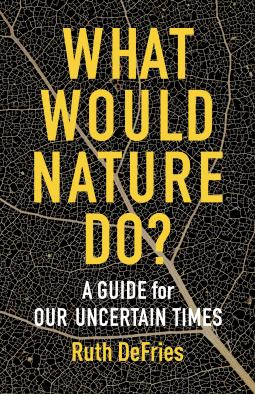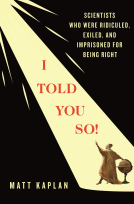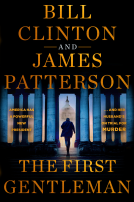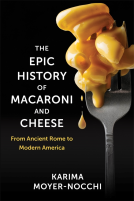
What Would Nature Do?
A Guide for Our Uncertain Times
by Ruth DeFries
This title was previously available on NetGalley and is now archived.
Send NetGalley books directly to your Kindle or Kindle app
1
To read on a Kindle or Kindle app, please add kindle@netgalley.com as an approved email address to receive files in your Amazon account. Click here for step-by-step instructions.
2
Also find your Kindle email address within your Amazon account, and enter it here.
Pub Date Dec 01 2020 | Archive Date Mar 10 2021
Talking about this book? Use #WhatWouldNatureDo #NetGalley. More hashtag tips!
Description
Ruth DeFries argues that a surprising set of time-tested strategies from the natural world can help humanity weather these crises. Through trial and error over the eons, life has evolved astonishing and counterintuitive tricks in order to survive. DeFries details how a handful of fundamental strategies—investments in diversity, redundancy over efficiency, self-correcting feedbacks, and decisions based on bottom-up knowledge—enable life to persist through unpredictable, sudden shocks. Lessons for supply chains from a leaf’s intricate network of veins and stock market-saving “circuit breakers” patterned on planetary cycles reveal the power of these approaches for modern life. With humility and willingness to apply nature’s experience to our human-constructed world, DeFries demonstrates, we can withstand uncertain and perilous times. Exploring the lessons that life on Earth can teach us about coping with complexity, What Would Nature Do? offers timely options for civilization to reorganize for a safe and prosperous future.
Advance Praise
"DeFries is an excellent writer, using elegant storytelling to offer a hopeful delineation of pathways to a sustainable future. She builds on evolutionary history, the theory of complex adaptive systems, and examples of the emergence of cooperation in biological systems, including human societies—distilling a complex topic for a broad audience. "
--Simon A. Levin, James S. McDonnell Distinguished University Professor in Ecology and Evolutionary Biology, Princeton University
Available Editions
| EDITION | Other Format |
| ISBN | 9780231199421 |
| PRICE | $100.00 (USD) |
Average rating from 11 members
Featured Reviews
Ruth links in a rather short book some ideas on how we can link societal behavior and organization to observations in nature and vice versa. It is one of these non-fiction books much alike Malcom Gladwells writings, sharing ideas and observations without actual scientific proof, but in a very entertaining way. Time flies by reading this, something that can easily be completed on a Sunday afternoon in a few hours.
The author says in the afterword something along the lines of having percolated quite a bit on this book, before she actually wrote it down. A little more on the simmer-stove could have probably lead to another few chapters instead of a rather short book, where the summary at the end almost feels a little repetitive - just you literally just read the entire book.
Still a nice, illuminating and interesting read. Something I proudly would share with the public in my Little Library.
 Elizabeth K, Reviewer
Elizabeth K, Reviewer
I read this book as a pre-release e-book obtained through NetGalley, provided by the publisher.
Networking. It’s a subject much is written about to help us with our careers, as well as how it helps corporations. Networking is what goes into international diplomacy – networking among governments. When networks break down – often from a single point of failure, they cascade into human lack and shortages, leading to starvation, violence, and revolutions. Sociological networks revert to hub-and-spoke topologies, whereas computer networks have designed archetectures of more robust types, which do not automatically reconfigure themselves.
Human societies need to avoid single points of failure.
Nature has, over billions of years of trial and error created different ways to avoid points of failure. That goes from the leaf structure of plants, from the ancient ferns and ginkgos to modern flowering plants and trees, using “hierarchical nested loops” for flow of water, sugar, and nutrients. As a modern leaf can sustain damage without killing the entire leaf, and individuals in an animal colony can have individuals infected or killed without destroying the entire colony, humans can learn from these natural strategies to make our societies – from our neighborhoods, corporations, and even national governments less prone to collapse which disrupts society and the distribution of goods and services. We can learn from nature to design more robust networks for humankind, rather than allowing these networks to revert to a hub-and-spoke topology, with a single point of failure at the hub.
This all seems to work better with a bottom-up design rather than a top-down design, dictating from the top what should be done. The local levels, and even individuals, have a better idea of their local conditions and concerns than a centralized authority can have. One solution does not fit all situations, regions, and individuals. Single-sourcing any item will always lead to failure of that source.
A great deal was included regarding tragedies of the commons, how long-lasting “primitive” societies solved it, how animals and even plants solve the issue.
Other parts of the book describe how disease can be isolated and contained. Colonies of insects do this instinctively, even though they certainly do not understand the disease nor have vaccinations. Humans can do this too, even without or before a vaccination is developed. Certainly, this works better with an effective vaccination, as our experience with smallpox shows.
Climate change and greenhouse gas emissions are essentially a tragedy of the commons. The author describes successful and unsuccessful ways these tragedies of the commons have been handled from ancient to modern times – even nature’s handling of such issues.
We can observe nature, learn from it, and improve our societies based upon nature’s solutions over billions of years.
 Paul V, Reviewer
Paul V, Reviewer
This is succinct book containing some pretty fascinating info. I hope we all learn from it and apply some of the lessons pointed out, which includes massive number of people working together. Recommended.
Thanks very much for the ARC review.
This was a brief book about how society needs to observe nature and make changes accordingly to save the planet. Very politicized and not what I was expecting from this. Just ok in my opinion. Still worth the read but not even close to my favorite on climate change and conservation.
Thanks to Netgalley, Ruth DeFries and Columbia University Press in exchange for an honest review.
Available: 12/1/20
 Anne J, Reviewer
Anne J, Reviewer
In the world of business and technology, we turn to nature for analogies and metaphors for complex subjects. But maybe we should dig deeper into the natural world to understand resilience and longevity.
In What Would Nature Do?, Ruth DeFries draws key lessons directly from the natural world to apply to human endeavors in a time of uncertainty and disruption.
Evolution is the definitive testbed for the long-term viability of innovations. DeFries writes, “Complex, adaptive systems survive only if they can persist through an uncertain and unpredictable world.” So where better to look than nature itself, subjected to eons of evolutionary forces, disruption, and uncertainty?
Subjects include:
How nature creates networks that avoid cascading failures
Diversity as the ultimate hedge against disruption
Self-regulating feedback loops, in carbon cycles and stock markets
If you want to design organizations or policies that last, dive into this book.
 Adam D, Reviewer
Adam D, Reviewer
Despite the potentially terrifying subject matter, this book is an uplifting exploration into the resilience of nature, and how we can learn from it. I have long been interested in how the observation of natural processes can be lead to new insights in surprising areas. This book provides a fascinating look at the connections between the non-human natural world, and the societal constructs that we humans view as apart from nature. This is a really thought provoking book and provides an excellent jumping off point for learning more about biomimicry and its role in complex adaptive systems.
Great read!
Readers who liked this book also liked:
Karima Moyer-Nocchi
Cooking, Food & Wine, History, Nonfiction (Adult)











